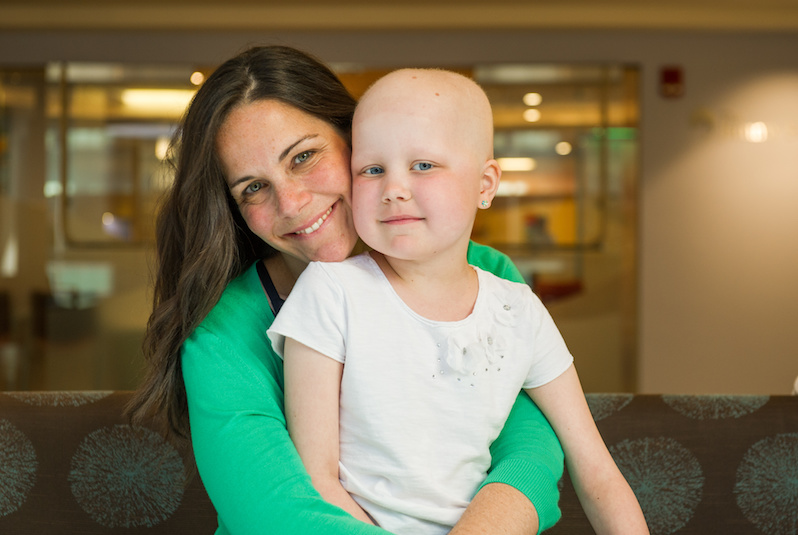What role do genetics play in pediatric leukemia?

Leukemia is the most common childhood cancer, accounting for 31 percent of cancers in children younger than 15, and 25 percent of those younger than 20. Most young patients develop leukemia because of a mutation, or DNA change, that occurs randomly in a blood cell only, and is not inherited from a parent.
On the other hand, there are some syndromes caused by mutations in the “germline” that are present in every cell of the body. These can be inherited from a parent, creating a predisposition to a variety of cancers. These cancers may include leukemia and other blood disorders.
It’s been estimated that at least 10 percent of pediatric cancer patients — not just those with blood disorders — have a germline mutation in a known cancer predisposition gene. If a leukemia-predisposing syndrome is diagnosed in a parent, then in some cases it might be appropriate to consider genetic testing of a child, that might lead to close surveillance to watch for any signs or symptoms of a blood abnormality.
Syndromes that raise the risk of leukemia
Examples of genetic syndromes that can raise the risk of leukemia in a pediatric patient include:
- Down syndrome, or trisomy 21. Children with Down syndrome have a significantly higher risk of developing acute lymphocytic leukemia (ALL) or acute myeloid leukemia (AML) than other children. Down syndrome has also been linked with transient myeloproliferative disorder — a leukemia-like condition in the first month of life that often resolves on its own without treatment.
- Li-Fraumeni syndrome. Caused by a mutation in the TP53 tumor suppressor gene, this condition creates an elevated risk of cancers in both childhood and adulthood, including several kinds of solid tumors and leukemia.
- Other genetic disorders that can carry an increased risk of leukemia include neurofibromatosis 1 and Noonan syndrome, inherited bone marrow failure disorders such as Fanconi anemia and Schwachman-Diamond syndrome, and inherited immune disorders such as ataxia-telangiectasia, Wiskott-Aldrich syndrome, and Bloom syndrome.
Genetic testing
Genetic testing in a child to detect an inherited leukemia predisposition syndrome would be considered especially when there is thought to be benefit from early detection and surveillance — which, for example, could prompt earlier intervention, according to Dr. Junne Kamihara, an attending physician in the Jimmy Fund Clinic and co-director of the Pediatric Cancer Genetic Risk Program at Dana-Farber/Boston Children’s Cancer and Blood Disorders Center. In the setting of many bone marrow failure syndromes, for example, one could screen for a myelodysplastic syndrome before it evolves into AML.
Dr. Kamihara and Jaclyn Schienda, a lead program genetic counselor, say that a child diagnosed with any type of leukemia or a parent with questions may meet with a genetic counselor or a physician in the Pediatric Cancer Genetic Risk Program to explore these issues.
“Sometimes parents will read about genetics and wonder about their family history of cancer, at other times pediatricians may refer patients to us because of a known family history of cancer or cancer syndrome,” explains Kamihara, “We are always happy to have families talk with our team to better understand whether genetic testing may be helpful, and to determine if an underlying leukemia predisposition syndrome may have played a role in the cancer. This helps determine if a sibling or other family members should be offered testing as well and whether screening is available.”
Learn more about pediatric leukemia from Dana-Farber/Boston Children’s Cancer and Blood Disorders Center.
Related Posts :
-

A true hero’s journey: How a team approach helped Wolfie overcome pancreatitis
Wolfgang, affectionately known as “Wolfie,” is a bright and energetic 7-year-old with a quick wit and a love for making ...
-

A toast to BRD4: How acidity changes the immune response
It started with wine. Or more precisely, a conversation about it. "My colleagues and I were talking about how some ...
-

A new druggable cancer target: RNA-binding proteins on the cell surface
In 2021, research led by Ryan Flynn, MD, PhD, and his mentor, Nobel laureate Carolyn Bertozzi, PhD, opened a new chapter ...
-

Forecasting the future for childhood cancer survivors
Children are much more likely to survive cancer today than 50 years ago. Unfortunately, as adults, many of them develop cardiovascular ...





